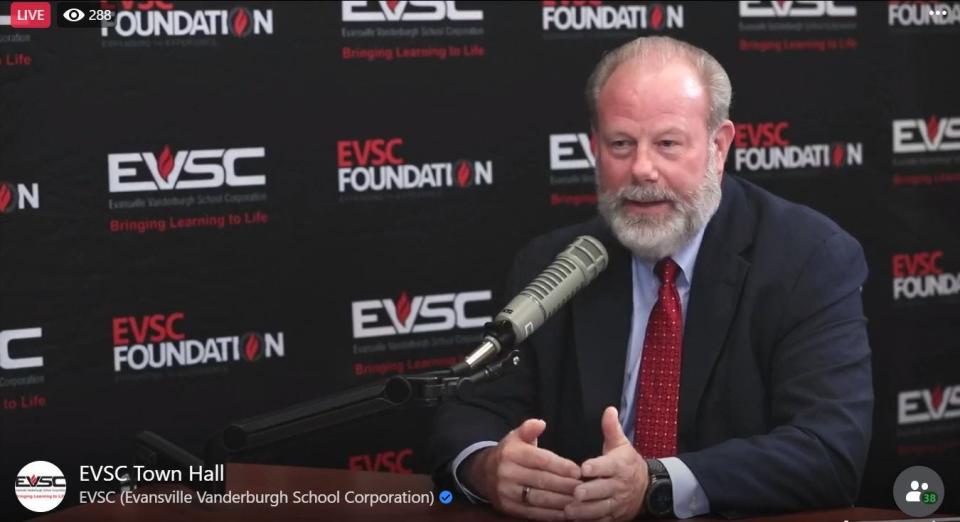EVSC won't provide 'protected' arrest records, even as state expert says some are public
EVANSVILLE – The issue, Luke Britt said, is “pretty straightforward.”
If the Evansville Vanderburgh School Corp. Police Department arrests any student for an offense that would also be a crime if an adult did the same thing, it’s public record, said Britt, the Public Access Counselor for Indiana.
That includes the nature of the offense and the circumstances surrounding it; the age and sex of the child who committed it; a description of how the person was apprehended and even, in certain circumstances, the name of the student.
It’s right there in Indiana law, said the state’s public access counselor.
Despite that, the EVSC and Superintendent David Smith have refused to disclose what the corporation calls “protected” records relating to arrests by its in-house police force. They've repeatedly declined to say what those records are, and if they include non-delinquency arrests.
On April 11, the Courier & Press filed a records request seeking all arrests made by the EVSC PD over the last two years. The EVSC didn’t fulfill any part of that request until six months later. And when it did, it only sent along four arrests – none of which involved students.

They claimed they withheld “protected records,” but didn’t explain what those were, nor did they initially provide the state code that allowed them to keep those confidential, which they are required to do under Indiana law.
After multiple requests from the Courier & Press, EVSC attorney Pat Shoulders offered six statutes last week.
“Dr. David Smith, EVSC Superintendent, has protected records in the possession of the EVSC in compliance with the confidentiality requirements of the following Indiana laws:
“IC 5-14-3-4 (a)(1) – records declared confidential by state statute
IC 5-14-3-4 (a)(3) – records required to be kept confidential by federal law (see FERPA)
IC 5-14-3-4 (b)(1) – investigatory records of law enforcement agencies
IC 5-14-3-4 (b)(21) – personal info about a complainant
IC 39-39-2-1 and IC 31-39-4-1 – protection of juvenile records.”
“None of those apply to arrests,” Britt said when the Courier & Press forwarded him the list. “And there is no such statute as IC 39-39-2-1.”
Shoulders later clarified he meant 31-39-1-2. When asked, again, to provide statutes that allowed for the denial of arrest records, he took issue with Britt’s opinion.
“As recent articles in your paper have demonstrated, Luke and I have different opinions on the laws applicable,” he said. “You have our answer. Thanks.”
Britt responded that he has “no problem with attorneys disagreeing with my interpretation of ambiguous statutes.”
“I do take some exception to disagreement on non-ambiguous statutes,” he said.
What the statutes say
None of the statutes cited by the EVSC specifically mention arrests.
IC 5-14-3-4 (b) (1) is the clearest, saying “investigatory records of law enforcement agencies or private university police departments” can be kept confidential, except in the case of video and audiovisual recordings, such as that from body cameras.

However, Indiana code differentiates between “investigatory records” and “law enforcement activity,” the latter of which includes arrests.
For instance, in Evansville Police Department or Vanderburgh County Sheriff’s Office cases, certain parts of the investigatory record are confidential, but information related to arrests – mainly incident reports and probable cause affidavits – are considered public record.
Any matter within those reports and affidavits that’s deemed confidential – including information involving victims or, in some cases, juveniles – is redacted and the report is subsequently released.
The Courier & Press isn’t seeking juvenile court records or the names of students who committed crimes – only information that is typically included in arrest reports, such as the nature and location of the offense, the age of person who allegedly committed it, and the context around the crime.
All of that is public record under Indiana statute 31-39-3-2, Britt says.
That doesn’t include juvenile delinquency. Things such as alcohol or tobacco possession wouldn’t be disclosable. Only issues that would be crimes whether they were committed by a juvenile or an adult are public. Those are the records the Courier & Press seeks.
IDOE keeps statistics on arrests
The EVSC hasn’t answered multiple questions as to whether their “protected records” include those kinds of arrests.
The Indiana Department of Education, meanwhile, keeps track of reams of data – and published some of them in a report last year.
In the “Indiana Schools Bullying, Safety Staffing, and Arrests Report” from 2022, the IDOE reported 1,291 arrests during the 2021-22 school year. That includes kids arrested both at school and off site for school-initiated reports, but the vast majority, 1,166, were actually apprehended on school grounds.
Those arrested were as old as 19 and as young as 8. Fourteen-year-olds (284) were arrested at the highest clip, followed by 15-year-olds (266) and 13-year-olds (207).
Race-wise, 51% of arrestees were White and 26% were Black.
The numbers include both delinquencies and issues that would be crimes if they were committed by an adult. Battery was the most common offense, at 28%, followed by possession of marijuana at 24%.
Every public-school corporation responded to the study, the report states. Of those, 43 of those had established an in-house police force such as the EVSC PD; 421 had not.
What the report doesn’t do is break down the numbers by school corporation. There’s no way to know how many of those arrests come from the EVSC.
This article originally appeared on Evansville Courier & Press: EVSC declines to show arrest records, despite Indiana expert's opinion

